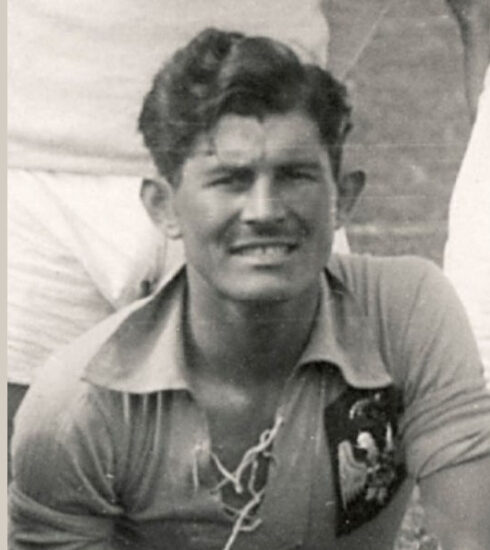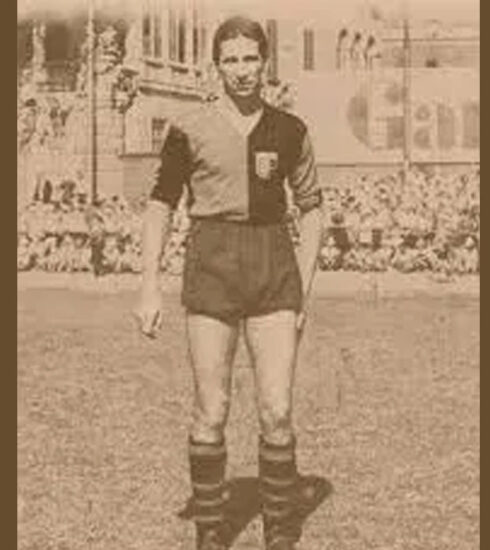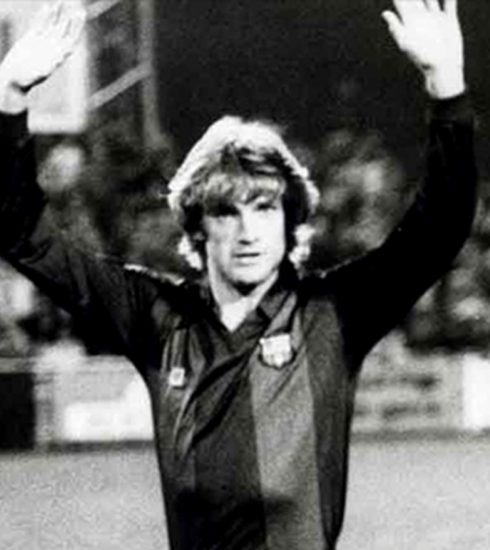ANTONIO ‘EL RATA’ RATTIN: There is only one captain



The curse of this story is encapsulated in 10 crazy minutes that consigned this per’altro excellent footballer to football history.
It is 23 July 1966. We are playing for the quarter-finals of the World Cup.
The stadium is Wembley.
Argentina plays against the hosts, the ‘Lions of England’ of Charlton, Moore and Stiles.
The match is balanced, not particularly spectacular and up to that point rough, played in a determined manner by both sides but not unfair.
The trouble is that for every decisive entry by the Argentinians a caution is given (it should be pointed out that at the time there were no cards but simply the referee wrote down the cautioned players in his notebook) while for the English, for Nobby Stiles in particular, it seems that a different standard of judgement existed that day. None of the ‘whites’ were in the referee’s notebook.
A few minutes earlier Rattin too, with the number 10 on his shoulders and the captain’s armband, was cautioned by the German Kreitlein for a harmless attempt to trip Bobby Charlton.
A free kick was awarded to the English, a few metres outside the penalty area; enforcing the barrier at that time was not easy and the Argentinians tried to gain precious metres.
The English, however, took the free kick by surprise.
The ball ended up well wide of the posts defended by Argentine arquero Roma.
The images are not very clear but it seems that referee Kreitlein cautions another Argentine player, centre forward Artime, guilty of not respecting the distance at the time of the kick.
At this point Rattin approaches the referee to ask for an explanation.
Rattin spoke neither English nor German.
In the TV pictures the umpire can be seen suddenly stopping and signalling to Rattin to leave the field.
“I don’t know what he said to me … but he was looking at me in a truculent way. And so I ejected him’. The German black jacket later declared.
It was just another way of ‘unbalancing’ a match that had hitherto been very complicated for the future world champions.
Rattin, however, does not stand for it.
He demands explanations.
He does not understand why he has to leave the field.
In such an important match!
The ten minutes that follow are tragicomic.
Rattin really doesn’t want to leave the pitch.
They try to explain the situation to him, someone even tries to take him by the arm to accompany him outside.
The captain of Argentina and Boca Juniors reacts indignantly.
Let no one touch him.
He later says that he demanded an interpreter, someone to explain to him WHY he had to leave the field in such an important match.
Eventually the match resumed, but he first remained on the sidelines and then decided to sit on the red carpet for the exclusive use of members of the British royal household.
An unfortunate and unconscious decision that unleashed even more the wrath of the Wembley crowd who, unexpectedly losing their famous self-control, threw everything at ‘El Rata’, sweets, snacks and even beer cans.
In ten for the entire second half, Argentina ended up conceding, albeit by a narrow margin, thus seeing themselves ousted from a World Cup that, after so many years of poor performances, really promised great things.
‘Animals’ were defined by Sir Alfred Ramsey, coach of the English team, as the Argentine players guilty of unsportsmanlike behaviour and unconscionable rudeness on a football pitch.
Rattin was branded by this encounter and, as often happens, his enormous talents as a footballer ended up taking second place to those ‘crazy’ ten minutes at Wembley.
“Everything had already been decided,” recalls Rattin in a wonderful interview some time ago, “The delegates of Argentina and Uruguay were informed that the referee draw would be held at 7 p.m. Only when they arrived it had already been decided; England-Argentina to a German referee and Germany-Uruguay to an English referee !”
Also interesting is his theory about the World Cup up to 1970, the first to be broadcast live and via satellite.
“Until then the revenue for FIFA could only be guaranteed in one way. full stadiums filled by the organising team of the tournament. Sweden in the final in 1958, Chile in the semi-finals in 1962 and England champions in 1966. From 1970 onwards it was no longer so decisive to take the organising team to the finals, as FIFA had already secured the revenue with the television rights’.
Rattin was one of the greats of Boca Juniors.
He played there for 15 seasons, from 1956 to 1970, winning four championships and one Argentine Cup.
With his 190 cm he was placed in front of the defence, as a classic ‘5’, that figure somewhere between the defensive director and the most arch-rival.
His leadership skills have entered the legend of Argentine football.
He was loved by his teammates and respected by referees and opponents.
A proverbial ‘chat’ he had with Pelé, in the same match in which ‘El Chino’ Mesiano took a header with the ball away from ‘O’Rey’ and had to leave the field.
It happened in the decisive match of the ‘Nations Cup’ (the only international trophy won by Argentina before the 1978 World Cup).
Rattin expressly asked the Argentine coach at the time, Pepe Minella, to bring in Telch, a striker in place of the injured Mesiano.
‘I’ll take care of the ‘Negro’ (Pelé),’ said Rattin.
There is a corner kick for Brazil.
Rattin approaches Pelé.
O’Rey can tell from the look on “Rata’s” face that he is not exactly conciliatory after seeing a comrade come out bloodied after the “treatment” of Brazil’s “10”.
“Rata” anticipates him a worried Pelé “With the ball in play ok, but without the ball not eh ?”
“Don’t worry” Rattin seraphically answers him. “Without the ball no … but as you have the ball I’ll kill you”.
Pelé practically never touched the ball again for the rest of the match.
Argentina won 3-0 and even Pelé refused to take a penalty kick, leaving it to Gerson who had it parried by Amadeo, the Argentine goalkeeper.
Antonio Rattin would end his career at the age of 33, in Boca Juniors of course, and after a brief spell as coach of first Gimnasia La Plata and then his own Boca, he would end his career in football in 1980 and then devote himself to politics and work in the insurance industry.
There is a statue of him in the ‘Xeneize Museum’ inaugurated a couple of years ago, testifying to the love and respect of the Boca people for this great footballer, unfortunately remembered outside Argentina only for the crazy ten minutes at Wembley.

ANECDOTES AND CURIOSITIES
At his first training session with Boca he was forced to play with normal walking shoes as nobody could find a pair of football boots suitable for his enormous foot. (apparently he wore a 47).
His Boca debut was in none other than a ‘Superclasico’, against hated rivals River Plate.
The previous Wednesday he and teammate Yaya Rodriguez were called up to the first team by the ‘Tercera’ (practically Boca’s Beretti team, bypassing even the ‘Primavera’, then called the ‘Reserva’, the second team after the first team).
Only a few days before, Rattin broke his wrist. The coach doesn’t like it, but tries him out in the match anyway.
Result? Rattin plays so well that the following Sunday he is a starter against River, with a protector instead of a cast so he can play.
Another memory of that memorable day
“There were no retreats back then. You went home and had to be at the stadium an hour and a half before the match. I was determined to go by bus when I discovered that a neighbour was going to watch the game together with 40 crazy guys from my Barrio in an old Chevrolet 47.
I had the place of honour in the cab next to the driver and so I reached the Bombonera!”
Rattin was also one of the promoters of a wonderful initiative to help former Boca players who had fallen into disgrace.
The proposal was that 1% of the contract of each professional Boca player would be made available to historical players of the club in financial difficulty.
Once identified, Boca in turn would put another 1% …
(To this day I am aware of more than twenty old glories ‘Xeneizes’ benefiting from this kind of pension).
One of the most intense memories obviously concerns what happened at the famous ‘Puerta 12’ in which Rattin was one of the protagonists on the field.
“I was driving home after the match when news started coming in on the radio about that terrible tragedy. Among other things, they said there was a need for blood… I immediately went to the Pirovano hospital for a donation… but they refused it because I was very tired, having just finished the match.
His relationship with River is something rare in those parts, precisely because of the respect that the figure of Rattin has always been able to inspire even in the fans of the ‘Millionarios’.
When asked if River’s relegation a few years ago caused him joy or pleasure, his answer is unequivocal: ‘No, absolutely. I say this from the heart. Boca and River are the two locomotives of Argentine football. All the others are wagons stuck in the back. We need them as much as they need us.”
The saddest day was, by his own admission, the day he retired from playing football.
“It happened in a match with Banfield. I had been having big problems with my Achilles tendons for some time, I was struggling to run normally. In the first half of that match I just couldn’t run. My teammates even stopped passing me the ball at one point. I had become a burden.
I asked for a change at half-time.
I took the car and drove home, even before the match was over.
I realised that I had reached the end of my rope.
I never played another minute for Boca in an official match.
Finally, the most controversial and delicate part.
The admission, without uncertainty or hypocrisy, that for a certain period the use of stimulants (amphetamines above all) in Argentine football were the norm.
‘They were injections that footballers underwent. The product in question was the same as that used at the Buenos Aires racetracks for horses. You could run two days in a row,’ recalls Rattin.
‘When I arrived at Boca as a trainer, they prohibited its use.
They called them special vitamins at the time.
Within a few games, all lost, we finished second to last.
At this point I retraced my steps.
I gave the go-ahead for their use.
We won practically every game between then and the end of the championship, finishing in 7th place.
If I hadn’t changed my mind Boca would have ended up in B”.
He added that “At that time I didn’t say anything. There was a dictatorship in the country’.
Artime (Argentina’s centre forward at the 1966 World Cup) made some admissions.
He was immediately summoned by the government and the matter was immediately covered up.
It was only in 1980 that doping controls began to be carried out in every match in the championship.
Antonio Rattin is now 82 years old, but ‘the last Caudillo’ as he was often nicknamed in Argentina, still goes to the Bombonera, follows football and puts Leo Messi on the same level as Maradona … but one step below the great Pelé.







